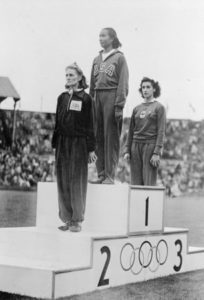
Alice Coachman, (center), of Albany, GA., stands on the winner’s section of the Olympic podium at Wembley Stadium, Wembley, England, August 7, 1948, to receive the gold medal for winning the women’s high jump.
Photo credit: Associated Press
It wasn’t until her death this time last year that many had ever heard the name Alice Coachman Davis. She should’ve been praised among the ranks of legendary Olympic athletes, though she never reached the same level of national stardom and recognition. But in 1948, the Albany, Georgia, native made history as the first African-American woman to win an Olympic gold medal.
Though, as such a groundbreaking pioneer for Black female athletes, why had she remained largely unrecognized until her death last July? A reflection of her life may shed some understanding on the mystery of Alice Coachman Davis, as well as what distinguished her as such an unstoppable competitor in her prime.
Born in 1923 as the fifth of 10 children, Coachman Davis learned tough athleticism in the dirt roads, sweltering temperatures, and thicket of poverty and racism of rural Albany, Georgia. Coming of age during a time when young women were discouraged from competitive sports — and likely far less extracurricular support for little Black girls — she faced backlash from society, and even her family, once she took an interest in sports like track and field, baseball and soccer. Her father thought “girls should be dainty and sit on the porch and drink tea and not do sports,” according to Heather Lange, author of “Queen of the Track: Alice Coachman, Olympic High Jump Champion.”
But Coachman Davis says this discouragement ultimately helped her gain a competitive advantage.
“I didn’t have any girls for playmates because they were ladylike,” she said in a 2004 interview with NPR. “So I was really a boy in the sight of the other boys I was playing with. And when I look back, maybe if I hadn’t played with them, I wouldn’t have been as good as I am. That was my competition right there.”
Her initial training consisted of running barefoot and using whatever was available, ropes or rags, for practicing jumps. But after her skills were nurtured in high school and she was discovered by Tuskegee Institute, she consistently excelled in track and field. From 1939 to 1948, she garnered 10 consecutive wins in the Amateur Athletic Union high jump championship and earned national championships in the 100-meter dash and 4×100-meter relay.
It was during this time that her athletic career might have hit its springboard much earlier than history would dictate. But due to World War II, the 1940 and 1944 Olympic Games were canceled, eliminating her chances to participate during her college career. It wasn’t until 1948 at age 24 — with a back injury, sources say — that Coachman Davis finally competed in the Olympics held in London. She dominated her competition, British high jumper Dorothy Tyler, jumping a record-setting 5 feet 6 1/8 inches.
“I didn’t know I’d won,” Coachman Davis later said of the experience. “I was on my way to receive the medal and I saw my name on the board. I glanced over into the stands where my coach was, and she was clapping her hands. “I went on, stood up there, and they started playing the National Anthem. It was wonderful to hear.”
Personally presented her gold medal by King George VI, she set a precedent not only for her race that day but also her nation as the only American woman to win gold for track and field in the London Games.
While recognized abroad in London as a hero, Coachman Davis did not receive the fanfare record-breaking Olympic athletes might receive today upon returning to their homes. Fair enough, she was personally congratulated by President Harry Truman, traveled in a motorcade from Atlanta back to Albany and was honored with a ceremony attended by the town’s mayor. But Coachman Davis was ultimately coming back to a segregated South, and her achievement was drastically overcast by the gloom of discrimination of the 1940s. During her honorary ceremony, the audience was segregated and Coachman Davis herself had to enter and exit through the side door.
“To come back home to your own country, your own state and your own city, and you can’t get a handshake from the mayor? … Wasn’t a good feeling,” she told NPR.
The London Games were the last time she competed as a professional athlete. Many believe that if she had competed in the canceled Games prior to 1948, history would’ve been written differently and the American people would remember her more vividly. “Had she competed in those canceled Olympics, we would probably be talking about her as the No. 1 female athlete of all time,” wrote Eric Williams of the Black Athlete Sports Network.
She recalled watching Wilma Rudolph 12 years later, and her subsequent rise to fame and recognition as a game-changer for Black female athletes after winning three gold medals for track and field in a single Olympic Games. Whereas Coachman Davis reached her peak premature of civil rights era, Rudolph ascended in 1960 — a different time and place, during the height of the civil rights movement when change was coming and the people were looking to young Black role models to forge the path.
Rudolph’s accomplishments were also more publicized, as the 1960 Olympic Games were the first to be widely televised internationally. This further sealed her fate as an international household name for decades to come. Many books and articles during that time continuously credited Rudolph as the first Black female athlete to win Olympic gold, according to NPR.
Post-Olympics, Coachman Davis strived to make a significant impact on young athletes in her community. Sources say she taught, coached and became involved with the Job Corps. And at 70 years old, she founded the Alice Coachman Track and Field Foundation, a nonprofit with a mission to assist young athletes and help former Olympic athletes transition back to their post-game lives.
In her later life, she was eventually recognized for her achievement. At age 73 at the 1996 Olympic Games in Atlanta, she was recognized as one of the 100 greatest Olympic athletes in history. At age 80 in 2004, she was inducted into the U.S. Olympic Hall of Fame. Additionally, she was finally recognized in her hometown when Albany named the Alice Coachman Elementary School in her honor. Sources say she was also named an honorary member of Alpha Kappa Alpha Sorority, Inc.
Among other firsts, she became the first African-American female athlete to garner an endorsement deal when Coca-Cola hired her as a spokesperson in 1952. Sources say the endorsement earned her $500.
Despite the lack of recognition she received, Coachman Davis remained confident in her contribution to Black athletes. “I made a difference among the blacks, being one of the leaders,” she told The New York Times. “If I had gone to the games and failed, there wouldn’t be anyone to follow in my footsteps.”
Gary Sailes, an African-American studies and kinesiology professor of Indiana University, said she focused more on what she could further contribute than on how she was slighted by historical accounts and American public opinion. “She had a higher agenda than dealing with the racial polarization,” Sailes said. “She rose above it by focusing on the work and what she needed to accomplish.”
As her passing made major headlines all over the nation last year on July 14, only time will tell if America will remember her accordingly— as the legendary game-changer she was — when mourning the anniversary of her death, as we should have done during her life.
She is survived by two children, Evelyn and Richmond.


